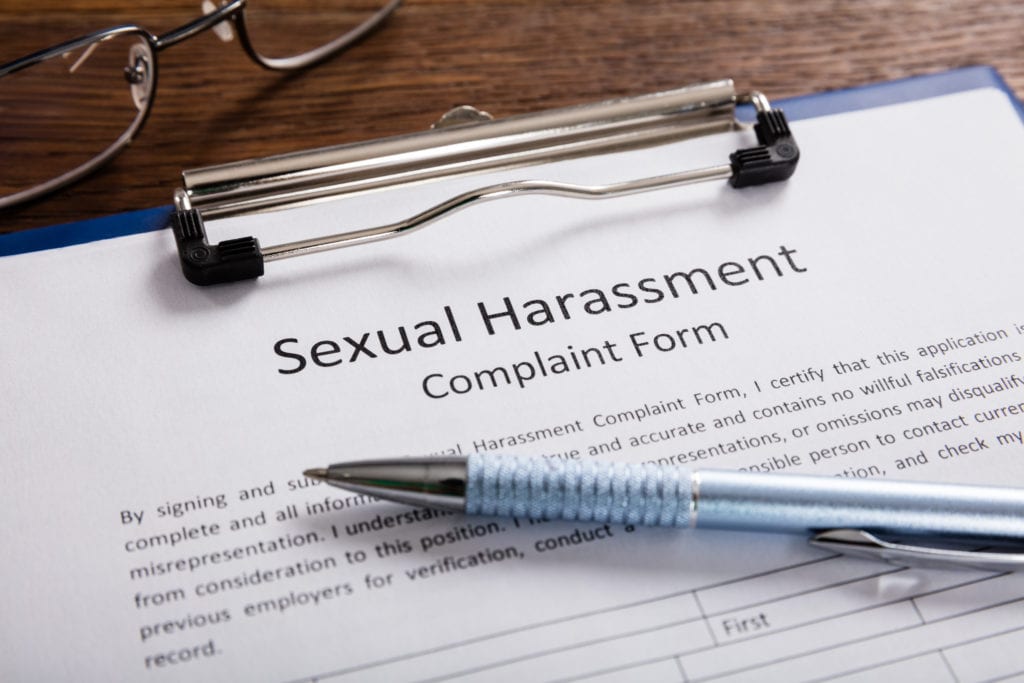Brian J Graber LLC. is a federal sexual harassment lawyer representing Illinois, Indiana, and Michigan employees suffering from workplace sexual harassment in violation of federal sexual harassment law. Title VII of the Civil Rights Act of 1964, as amended by the Civil Rights Act of 1991, is the federal sexual harassment law that provides employees with a federal right to be free from workplace sexual harassment.
The Federal Arbitration Act was amended effective March 3, 2022, to bar mandatory arbitration agreements covering workplace sexual harassment and sexual assault claims. Click here to learn more about your rights to be from mandatory arbitration agreements under Federal law.
A Private Employer Must Employ The Required Number of Employees to be Covered By Federal Sexual Harassment Law
Title VII, 42 U.S.C. 2000e(b), only applies to private employers having fifteen or more employees for each working day in each of the twenty or more calendar weeks in the current or preceding calendar year. An employer that does not employ fifteen or more employees required by 42 U.S.C. 2000e(b) is not covered by the federal sexual harassment law. However, employees in Illinois also have broad protections under the Illinois sexual harassment law. Michigan employees also have protection under the Michigan sexual harassment law. Contact Brian J. Graber, a federal sexual harassment lawyer in Illinois at (312) 291-4648, or Indiana at (219) 232-9011, or Michigan at (269) 230-6054, or by email to learn more about your rights to be free from workplace sexual harassment in violation of Illinois, Indiana, and Michigan law.
Federal Sexual Harassment Law Burden of Proof
Federal sexual harassment law requires an employee to prove the following elements:
- The sexual conduct was unwelcome;
- The sexual conduct occurred because of the employee’s sex;
- The sexual conduct was sufficiently severe or pervasive that a reasonable person in the employee’s position would find the work environment to be hostile or abusive;
- At the time the conduct occurred, the employee believed the sexual conduct made his or her work environment hostile or abusive; and
- there is a basis for the employer’s liability.

Sexual harassment is unwelcome communications or conduct of a sexual nature. Sexual harassment claims include criminal acts such as sexual assault, unwelcome touching of a sexual nature (known as sexual battery), requests or demands for sexual favors, indecent exposure, sexually suggestive gestures, inappropriate comments of a sexual nature, viewing pornography, lewd comments of a sexual nature, threats of sexual violence, indecent emails or text messages of a sexual nature.

Employer Liability for Workplace Sexual Harassment
Under Title VII, an employer’s liability for workplace sexual harassment depends on the status of the harasser. Vance v. Ball State University, 570 U.S. 421, 423-424 (2013). If the harasser is a supervisor, the employer has vicarious liability for workplace sexual harassment. However, if the harasser is a co-worker or a non-employee, the employer is liable for workplace sexual harassment under a negligence standard. Therefore, it really matters, for the purpose of imposing liability on an employer, whether the harasser is a “supervisor,” a co-worker, or a non-employee.
The U.S. Supreme Court decides who qualifies as a “supervisor” for the purposes of imposing vicarious liability on an employer as follows:
We hold that an employee is a “supervisor” for the purposes of vicarious liability under Title VII if he or she is empowered by the employer to take tangible employment actions against the victim.
Vance v. Ball State University, 570 U.S. at 450.
The U.S. Supreme Court defined the term “tangible employment actions” for the purpose of imposing vicarious liability on the employer for a “supervisor” as follows:
We hold that an employer may be vicariously liable for an employee’s unlawful harassment only when the employer has empowered that employee to take tangible employment actions against the victim, i.e., to effect a significant change in employment status, such as hiring, firing, failing to promote, reassignment with significantly different responsibilities, or a decision to change benefits.
Vance, 570 U.S. at 431.
The U.S. Supreme Court held that the ability to direct another employee’s tasks is simply not sufficient to impose vicarious liability on an employer because employees with such powers are certainly capable of creating intolerable work environments, but so are other co-workers. Vance, 570 U.S. at 439. Only a supervisor has the power to cause “direct economic harm” by taking tangible employment action. Vance, 570 U.S. at 439-440.
Therefore, under federal sexual harassment law, only a supervisor/harasser who has been empowered by the employer to take tangible employment action to effect a significant change in the sexual harassment victim’s employment status imposes vicarious liability on the employer for the workplace sexual harassment.
Federal Sexual Harassment Law Imposes Strict Liability on an Employer When a Supervisor Takes Tangible Employment Action Against an Employee
The U.S. Supreme Court holds that Title VII imposes strict liability on an employer when a supervisor takes tangible employment action against an employee who refuses to submit to sexual demands as follows:
When an employee proves that a tangible employment action resulted from a refusal to submit to a supervisor’s sexual demands, he or she establishes that the employment decision itself constitutes a change in the terms and conditions of employment to be actionable under Title VII.
Burlington Industries v. Ellerth, 524 U.S. 742, 753-754 (1998)

If a supervisor’s harassment culminates in a tangible employment action, the employer is strictly liable. See Vance v. Ball State University, 570 U.S. 421, 424 (2013). Once a supervisor’s sexual harassment results in a tangible employment action, the employer has no affirmative defense to liability for sexual harassment. The U.S. Supreme Court ruled as follows:
No affirmative defense is available, however, when the supervisor’s harassment culminates in a tangible employment action, such as discharge, demotion, or undesirable assignment.
Burlington Indus. v. Ellerth, 524 U.S. 742, 765 (1998) and Faragher v. City of Boca Raton, 524 U.S. 775, 808 (1998).
If you believe you were terminated for refusing a supervisor’s sexual advances, contact Brian J Graber LLC, a sexual harassment lawyer, for a free confidential consultation in Illinois at (312) 291-4648 or Indiana at (574) 395-5189, or Michigan at (269) 230-6054 or send us an email.
Federal Sexual Harassment Law Imposes Vicarious Liability On An Employer For An Actionable Hostile Work Environment Created by a Supervisor
The U.S. Supreme Court held that an employer has vicarious liability for a hostile work environment created by a supervisor, but when the victim suffers no tangible employment action, the employer is allowed to raise an affirmative defense to liability as follows:
An employer is subject to vicarious liability to a victimized employee for an actionable hostile environment created by a supervisor with immediate (or successively higher) authority over the employee. When no tangible employment action is taken, the defending employer may raise an affirmative defense to liability and damages, subject to proof by a preponderance of evidence.
Burlington Indus. v. Ellerth, 524 U.S. 742, 765 (1998).
To raise an affirmative defense to the U.S. Supreme Court held that the employer must prove two necessary elements:
(a) that the employer exercised reasonable care to prevent and correct promptly any sexually harassing behavior, and (b) that the plaintiff employee unreasonably failed to take advantage of any preventative or corrective opportunities provided by the employer or to avoid the harm otherwise.
Faragher v. City of Boca Raton, 524 U.S. 775, 807 (1998).
Most employers have adopted written sexual harassment reporting policies. These sexual harassment policies require victims of workplace sexual harassment to report sexual harassment to management or human resources employees. Anti-harassment policies against sexual harassment, which include multiple avenues for reporting sexual harassment, are generally sufficient to satisfy the first prong of the Faragher-Ellerth affirmative defense. See Trahanas v. Northwestern Univ., 64 F.4th 842, 854 (7th Cir. 2023). Failure to report workplace sexually harassing conduct in accordance with the employer’s sexual harassment reporting policy opens the door for the employer to raise this affirmative defense to liability and damages. Courts have concluded that an employee’s subjective fears of confrontation, unpleasantness, or retaliation do not alleviate the employee from alerting the employer to the hostile work environment. See Shaw v. Autozone, Inc., 180 F. 3d 806, 813 (1999). In Trahanas v. Northwestern Univ., the court held that a plaintiff unreasonably failed to take corrective action provided by the employer by using the complaint mechanisms in the employee handbook, stating as follows:
Any fear of unpleasantness cannot excuse a plaintiff from using the employer’s complaint mechanisms. Failure of the plaintiff to alert her employer about the hostile work environment created by her supervisor establishes the second prong of the defense and the employer will not be liable under title VII.
Trahanas v. Northwestern University., 64 F.4th 842, 854 (7th Cir. 2023).
In Trahanas, 64 F.4th at 854, admission by the plaintiff that she received the employee handbook, signing the acknowledgment for which required the plaintiff to be familiar with the anti-harassment policy, the form provide that the plaintiff can reach out to anyone in HR; and whether or not the plaintiff actually read the handbook is irrelevant because it is undisputed that she received a copy of the policy and she was required to read it and comply with the it as a condition of employment – this amounts to constructive knowledge of the anti-harassment policy. Therefore, an employee facing workplace sexual harassment should review the employee handbook for a sexual harassment reporting policy and make every effort to report the workplace sexual harassment to the employer in accordance with that policy.

Employees reporting workplace sexual harassment in accordance with an employer’s sexual harassment reporting policy have engaged in protected activity under Title VII, 42 U.S.C. 2000e-3(a), anti-retaliation law.
Federal Sexual Harassment Law Imposes Liability on Employers For Co-worker And Non-employee Sexual Harassment Under a Negligence Standard
If the harassing employee is the victim’s co-worker or non-employee, the employer is only liable if it was negligent in controlling the working conditions. See Vance v. Ball State University, 570 U.S. 421, 424 (2013); Nischan v. Stratosphere Quality, LLC, 865 F. 3d 922, 931 (7th Cir. 2017). Evidence that the employee placed the employer on notice by reporting workplace sexual harassment in accordance with the employer’s sexual harassment reporting policy, and the employer fails to take reasonable steps to prevent and correct sexual harassment, may result in employer liability.
As described above, an employee reporting co-worker and/or non-employee sexual harassment in the workplace in accordance with his or her employer’s sexual harassment reporting policy is likely protected from retaliation under Title VII, 42 U.S.C. 2000e-3(a).
Federal Sexual Harassment Law Covers Same-Sex Sexual Harassment

The U.S. Supreme Court held that Title VII covers same-sex sexual harassment as follows:
We hold today that nothing in Title VII necessarily bars a claim of discrimination “because of sex” merely because the plaintiff and defendant (or person charged with acting on behalf of the defendant) are of the same sex. We see no justification in the statutory language or our precedents for a categorical rule excluding same-sex harassment claims from the coverage of Title VII.
Oncale v. Sundowner Offshore Servs., 523 U.S. 75, 79 (1998).

Retaliation Claims For Reporting Sexual Harassment
Title VII, 42 U.S.C. 2000e-3(a) imposes liability on employers for retaliating against employees who engage in protected activities like reporting workplace sexual harassment in accordance with the employer’s reporting policy, filing Charges of Discrimination with the EEOC or other State agencies, testifying or otherwise assisting in any investigation, or proceeding, or hearing into workplace sexual harassment conducted by an employer or a government agency. Title VII provides protection to co-workers who cooperate with a sexual harassment investigation, even if the co-worker was not a target of workplace sexual harassment.
Title VII requires an employee in Illinois, Indiana, or Michigan to file timely file a Charge of Discrimination with the Equal Employment Opportunities Commission (EEOC) within 300 days after the date of the adverse act claimed to be retaliation. Failure to timely file a Charge of Discrimination bars the aggrieved employee from ever recovering against the employer for the alleged retaliation. You can learn more about the time limits for filing Charges of Discrimination here. You can file a Charge of Discrimination with the EEOC here.
Contact Brian J Graber LLC, a federal sexual harassment lawyer in Illinois at (312) 291-4648, in Indiana at (574) 395-5189, or in Michigan at (269) 230-6054, or by email to learn more about your rights to be free from retaliation for reporting workplace sexual harassment under Illinois, Indiana, Michigan, and federal law.
Time Limits for Filing a Federal Sexual Harassment Claims
The law limits the amount of time you have to file federal sexual harassment and retaliation claims against an employer under Title VII. Generally, an employee in Illinois and Michigan must timely file a charge of discrimination with the Equal Employment Opportunity Commission within 300 days of the last act of sexual harassment. It is best to consult a competent federal sexual harassment lawyer as soon as possible to protect your rights under the federal sexual harassment law. You can learn more about the time limits for filing a Charge of Discrimination for sexual harassment with the EEOC here. You can file a Charge of Discrimination with the EEOC here.
Brian J Graber LLC is a federal sexual harassment lawyer representing Illinois, Indiana, and Michigan employees suffering from workplace sexual harassment in violation of federal sexual harassment law. If you would like to learn more about your federal rights to be free from workplace sexual harassment, contact Brian J Graber LLC, a federal sexual harassment lawyer in Illinois at (312) 291-4648, or Indiana at (219) 232-9011, or Michigan at (269) 230-6054 for a free confidential consultation. Illinois sexual harassment law provides broad protections to Illinois employees. Michigan sexual harassment law provides Michigan employees with the right to be free from sexual harassment under Michigan law. Indiana employees’ best remedies for sexual harassment are under the federal sexual harassment law.
